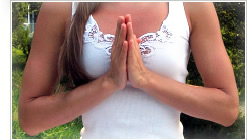|
Beginning Your Daily
Naam Meditation Practice
Discover a world of infinite possibilities with Naam Yoga
Meditation.

This page is designed to help you get started with a daily
meditation practice of breath work and mantra that you can build
upon in accordance with your specific goals. Commitment to a daily
meditation practice will have a healing impact on the glandular
system and the subconscious mind. If you have never used
meditation techniques or even listened to meditation music, rest
assured that everything is explained here step by step. It is a
joyful experience that will fill your days with hope and balance!
Most Naam meditation programs are composed of an opening, some
breath work, one or more mantras, a personal formal prayer, a
period of silence and a closing. The below steps are designed to
help you get started. The more you learn, the more options you
will see are available to you. All of the books by Joseph Michael
Levry are excellent references for putting together very specific
meditation programs for every personal need.
The Rootlight Meditation Music CDs may contain healing vibrations
unlike any other you have previously encountered. While some
tracks can be listened to casually and promote balance in your
immediate surroundings, others were created with the specific
purpose of concentrated meditation. This page is intended to help
those who are new to meditation to feel comfortable with the basic
steps. This process is well worth learning as it has positively
transformed thousands of lives by bringing healing to unresolved
emotional issues, speeding up recovery of physical issues,
increasing intelligence, creativity and intuition while opening
the heart and helping you connect with the infinite power of love.
Follow the steps below:
Step One: Find a comfortable sitting position
Step Two: Tune In
Step Three: Breath Work (Pranayam)
Step Four: Choose a Mudra (Hand Yoga) to Use With Your Mantra
Step Five: Chant Your Chosen Mantra
Step Six: Prayer of Love, Peace and Light
Step Seven: Tune Out
Step One: Find a comfortable
sitting position
You can sit on the ground with your legs crossed or you can sit in
a chair with your feet flat on the floor. Some people like to put
a cushion or a small blanket under their hips to allow for greater
comfort. Make sure that your spine is straight and tuck the chin
in. Think about relaxing your shoulders. The feet need to be lower
then the buttocks in order to support a relaxed straight spine.
Step Two: Tune In
Before actually starting the mantra, we suggest that you formally
open the practice. This can be done by chanting Om Namo
Bhagavate Vasudevaya a
total of three times. This mantra is found in audio form on the
Naam Pure Consciousness Activation
CD. It
establishes a connection between the self and the divine teacher
within.
Hand Position: Prayer Pose – Palms together in front of the solar
plexus.
Mantra: Om Namo Bhagavate Vasudevaya
Translation: I bow to the Lord, the Indweller, the Christ
Consciousness, the higher and loving consciousness, that is
omnipresent, omnipotent, immortal and divine and lives in the
hearts of all.
Music: You may choose to work with the Rootlight CD,
Naam Pure Consciousness Activation,
Track 1
Step Three: Breath Work (also
known as Pranayam)
Why do breath work? The breath is the foundation of your being. It
is the animating principle that allows you to exist in this world.
When the breath is shallow and frequent, as opposed to deep and
slow, it causes one to be emotionally unstable which causes people
to attract situations that do not serve their highest cause. When
the breath is long, deep, and slow, the mind is calm, the heart is
massaged, the nerves are strengthened, the glands are harmonized,
and we attract favorable circumstances into our lives. Try the
following breathing meditation technique at the beginning of your
daily practice to help you be calm, centered, and fortified.
Three Point Breath
Sit comfortably either in a cross-legged position on the floor or
in a chair that allows you to maintain a straight spine with your
feet flat on the ground. The important thing is that while your
spine is straight, the rest of your body is relaxed and
comfortable. Relax the shoulders. Three-point breath has three
parts, each part equal in duration. Based upon your lung capacity,
you are going to challenge yourself to inhale, hold the breath,
and then exhale in equal amounts of time. For instance, if you are
working on your breath capacity for the first time, you might want
to choose to inhale for 8 seconds, hold the breath for 8 seconds,
and exhale for 8 seconds. If your lung capacity is much greater
than this, you can inhale for 15 seconds, hold the breath for 15
seconds, and exhale for 15 seconds. Choose a ratio that works for
you and as time goes by, you can gradually increase it. The
ultimate goal is to inhale slowly for 20 seconds, hold the breath
for 20 seconds, and exhale for 20 seconds.
Depending on how much time you have and how quickly you would like
to see improvements, do this breath as a part of your daily
meditation practice for 3-11 minutes.
Here are some meditation techniques you can use to keep your mind
focused while you are doing this breath:
l
Mentally count the numbers as you inhale, hold the breath, and
exhale.
l
Work with a meditation music CD that has an appropriate rhythm to
follow. (Try working with the RaMaDaSa Healing Sound CD as it work
in sets of 8 and promotes general healing. Also track three of
Sounds of the Ether CD is excellent. It is designed to help the
heart beat at a very healing pace. Both CDs are found in the
Rootlight online store.)
Hand Position: Gyan Mudra - Thumb pad to index finger pad -
Traditionally speaking, Gyan mudra expands our consciousness and
promotes self-wisdom. It also helps to break through life
challenges. This mudra also stimulates the lung meridian.
Step Four: Choose a Mudra or
Hand Yoga postion to Use With Your Mantra
You can enhance the healing capacities of your daily meditation
practice by choosing to use a mudra while you meditate. While
there are thousands of mudras to choose from that address various
conditions, for the sake of simplicity we are recommending here
that you do one of these three:
Middle Pillar Mudra: Hold the hands six inches apart, palms
facing each other, at the heart center. This creates a healing
space within the aura and breaks through challenges
Prayer Pose: Palms touch with thumbs crossed over - This
mudra neutralizes the energies within the electromagnetic field,
thereby establishing balance within the practitioner.
Hands on the Heart: The hands are an extension of the
heart, and this mudra reconnects us with our heart and our inner
essence.
You might also choose to use a mudra, or hand-seal, while you are
breathing. Mudras are very important tools for directing the
body’s innate healing energy towards health and happiness. Mudras
are powerful symbols that bypass the intellect and communicate
directly with the subconscious mind. Every book written by Joseph
Michael Levry includes mudras. The Code of the Masters has an
extensive selection of mudras and the DVD Radiant Health with Naam
Yoga has a large mudra description and instruction section.
Step Five: Chant Your Chosen
Mantra
Part I – Choose an accompanying CD
 While
the choice of mantras is quite vast, the below recommendations are
particularly good for beginners. While
the choice of mantras is quite vast, the below recommendations are
particularly good for beginners.
l
To overcome health challenges try Ra Ma Da Sa: Healing Sound, The
Healing Spirit of Ra Ma Da Sa, or Kabbalah for Healing. These
meditation music CDs contain mantras and vibrations that have been
used throughout time for physical and emotional healing.
l
To attract opportunities into your life, for prosperity, and
wealth, try Green House, Seal of Higher Destiny, or Mystic Light.
The mantras and sound currents on these CDs will break down the
blocks that stand between you and your desired goals.
l
To create emotional harmony (including healing depression,
combating addiction, and healing destructive patterns) try
Blissful Spirit or Soul Trance. These CDs contain powerful healing
tracks that will give you the happiness and courage you need to
self-heal.
l
To develop intuition and for higher guidance, try The Flow of
Naam, The Seal of Higher Destiny, or Heaven’s Touch. The
meditation music on these CDs will heighten your intuitive powers
and guide you safely through life’s challenges.
Part II – Familiarize yourself with your chosen mantra and
meditation music
The first thing you will want to do is to familiarize yourself
with the specific mantra you are working with. Listen to the
mantra on the meditation music CD and then try repeating it slowly
out loud. Repeat it over and over until you feel comfortable with
it. If you need to, look at the pronunciation guide. Notice how
the combinations of syllables are causing the tongue to strike the
various meridians along the upper palate of the mouth. Try taking
deep breaths and reciting the mantra as many times as you can on
one breath until you have it memorized.
Part III: Put your hands in the mudra you have chosen.
Part IV: Starting the Meditation
Now that you are seated comfortably, familiar with your mantra,
and have your hands in a healing mudra, you can begin to chant
along with the CD. We recommend chanting for at least 11 minutes.
There is a very specific reason for this. It takes 11 minutes for
the effects of the mantra to impact the glandular system. The
glands are the guardians of our entire health. When stimulated,
they release the regulatory chemicals that give the body a sense
of bliss and euphoria. Try to do your meditation every day for 40
days, and if you can, at the same time of day. This will further
deepen its healing impact. Your body will begin to crave the peace
and equilibrium that are brought on by the meditation.
Part V – Closing the Mantra
To end your meditation, simply inhale deeply and suspend the
breath, stretch your arms overhead, and then shake your hands
vigorously for 15-30 seconds as you continue to breathe deeply.
This distributes the prana or energy you have created throughout
the entire body.
Most people chant more than one mantra. We recommend that self
prescribing beginners do no more than three in a day. Some choose
to do one mantra in the morning and a different one at night.
Others do the same meditations morning and night.
Step Seven: The Prayer of
Love, Peace and Light
Recite the Prayer of Love, Peace and Light as shown below. There
is a beautiful audio version of this prayer in the Blissful Spirit
CD and the Healing Fire CD. Many enjoy lying peacefully on their
back while listening to this prayer repeatedly. This prayer is a
positive affirmation that blesses yourself, loved ones and all
known and unknown.
|
Love before me
Love behind me
Love at my left
Love at my right
Love above me
Love below me
Love onto me
Love in my surroundings
Love to all
Love to the Universe
|
Peace before me
Peace behind me
Peace at my left
Peace at my right
Peace above me
Peace below me
Peace onto me
Peace in my surroundings
Peace to all
Peace to the Universe |
Light before me
Light behind me
Light at my left
Light at my right
Light above me
Light below me
Light onto me
Light in my surroundings
Light to all
Light to the Universe |
This prayer can be done in your choice of the same mudras listed
in Step Four above. Please also note that you can watch a
beautiful video of this prayer and send it to your friends right
on our
Facebook page by clicking on the
Send Light tab.
Step Seven: Tune Out
 The
closing of a personal meditation can vary greatly. We suggest that
you say your personal prayers in whatever way is right for you and
have at least a short moment of silence. Many like to recite
positive affirmations and even review a list of personal goals. The
closing of a personal meditation can vary greatly. We suggest that
you say your personal prayers in whatever way is right for you and
have at least a short moment of silence. Many like to recite
positive affirmations and even review a list of personal goals.
One way to complete a meditation is by saying the following Bij
Mantra: Sat Nam. Inhale, as you exhale say a long
SAAAAAAAAAAAAAAAAT and a short Nam, all in one exhale. This means
truth is my identity or my name is truth. This is typically done
in prayer pose.
Frequently Asked Questions
When is the best time to meditate?
Meditation can be at any time however there are times when it is
most effective. Meditating between the hours of 4 - 7 am and 4 -7
pm is most effective because those are the times that the human
mind and electromagnetic field are most open to change. These are
the hours of sunrise and sunset.
Do I need to do the same mantras day and night?
Some people choose to do the same mantra day and night if they
feel the need to increase the effect of that particular
meditation. Others choose to use different mantras in order to
address their various needs. It is also common to make a more
extensive practice during the hours they have more time and a
shorter practice during the busier hours.
Can I meditate while driving or exercising?
While performing a full practice during driving or exercise would
not be appropriate it is suggested to listen and chant to many of
the mantras during daily activity. Listening and chanting/singing
to the mantras is a wonderful way to spiritualize your daily
experiences and to emphasize the effect of your daily meditations.
For example, listening to Triple Mantra in the car while driving
will bring protection to driving. Listening to Ramadasa while
resting or cooking is excellent for creating a healing
environment. Chanting Eck Ong Kar from the Seal of Higher Destiny
CD while taking a walk helps to bring life into order. It is
strongly recommended that you integrate the meditation music into
your daily life to allow you to bring these powerful and ancient
words of power into your consciousness, strengthen your
electromagnetic field, enhance communication and bring healing
into your environment.
How long should I practice a particular meditation before
replacing it with a new one?
A Naam Yoga daily meditation is a vast and effective science. The
process of human growth occurs over time and in stages. Choose a
daily meditation program based upon your most important needs,
continue for 40 to 120 days and then alter the program if needed.
We suggest that you use between one and four mantras in one
chanting program. On the other hand, you may listen to as many as
you like. While in the process of sitting through the meditation,
you may experience a gamut of emotions, thoughts and feelings.
Some feel very calm, others find their mind wonders through many
thoughts and some occasionally feel overcome by emotions. This is
the process of the unconscious becoming conscious and your entire
being becoming aware of important aspect of your life that need
addressing. The process of meditation causes people to become more
spiritual. True spirituality is the state of becoming aware and
conscious of themselves and their surroundings. A spiritual person
begins to see the probable impact of their speech and actions.
Many find that keeping a journal is a useful adjunct to the
meditation program.
For more breathing and meditation techniques, yogic
exercises and poses for specific conditions, please refer to the
book the Divine Doctor: Healing Beyond Medicine.
Have a question?
Email us and we will try to answer it here.

In this intimate interview, Joseph Michael Levry (Gurunam)
discusses the hidden power of words, the spiritual art and science
of Naam Yoga and the Harmonyum Healing System. "We are both the
key and the door." This is a truly fascinating account of the
infinite potential that exists within each of us and what we can
do now to begin the process of awakening our Divinity.
There are four mantras mentioned in this interview. They can be
found on the
Flow of Naam,
Sounds of the Ether and
Soul Trance
CDs, respectively.
Source: KFAI Radio's Health Notes with Kinshasha Kambui
Note:
The suggestions on this page are provided for educational
purposes only and should not to be interpreted as medical advice.
|

